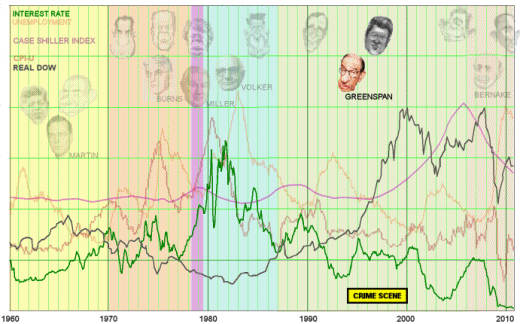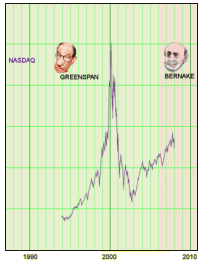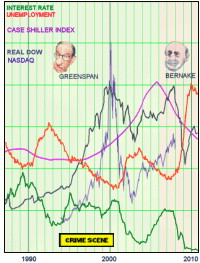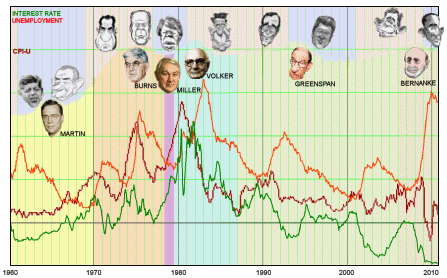in the time of a Blind Courtier: revisited
In the last episode [tales from the treasury: a summary…], I was discussing Alan Greenspan’s management of the Interest Rates during the first years of the Clinton Presidency. It was in the aftermath of the Recession that started in 1990. I’ve called it the crime scene previously:

What bothers me is that while it’s clear that the problem started in 1994 when he failed to bring the Interest Rates up to some reasonable level after a Recession leaving us in a period of "easy money," the rapid rise in the Stock Market is difficult to understand. It clearly antedates the beginning of the housing bubble. Over the next 5 years, the DOW way more than doubled. How did Greenspan’s low rates become such a driver of Wall Street?
 The answer is obvious. It was called the dotcom bubble. While technically what we call "the Internet" had been in existence for a long time, it was the playing ground for Banks, Universities, and Government for data transfer. Then in 1994, Tim Berners-Lee, a scientist at CERN [a physics think-tank in Switzerland], had an idea. He thought it would be useful if there were some way that people could exchange formatted documents [that referenced other documents]. So he devised some code for documents [html] and a viewing Browser [Mosaic] to decode them – ergo "the world wide web." Leave it to a nerd, I always say.
The answer is obvious. It was called the dotcom bubble. While technically what we call "the Internet" had been in existence for a long time, it was the playing ground for Banks, Universities, and Government for data transfer. Then in 1994, Tim Berners-Lee, a scientist at CERN [a physics think-tank in Switzerland], had an idea. He thought it would be useful if there were some way that people could exchange formatted documents [that referenced other documents]. So he devised some code for documents [html] and a viewing Browser [Mosaic] to decode them – ergo "the world wide web." Leave it to a nerd, I always say.
Well the implications for commerce and data exchange spread like a California wildfire and everyone wanted a piece of the action. Within a few years, companies hoping to find a niche in this new place called "cyberspace" were multiplying like rabbits – fueled by the "easy money" provided by [you guessed it] Alan Greenspan’s loose money policy.  So now I’ve add the dotcom bubble to the graph and the timing finally begins to make sense. Everyone in the universe may already know this, but what happened is that the phenomenal performance of the DOW during those years paralleled the even more remarkable rise in on the NASDAQ exchange [quadrupled].
So now I’ve add the dotcom bubble to the graph and the timing finally begins to make sense. Everyone in the universe may already know this, but what happened is that the phenomenal performance of the DOW during those years paralleled the even more remarkable rise in on the NASDAQ exchange [quadrupled].
As such things go, the dotcom bubble‘s bursting was pretty dramatic. Over the year 2000, it collapsed in toto, probably sparking the short Recession of 2001. Greenspan jumped on that Recession with a vengeance, ultimately dropping Interest Rates to ~1% – unheralded in our history. His massive drop in Interest Rates obviously fueled the housing bubble that had begun during the crime scene period of the late 1990’s. The dotcom bubble bursting didn’t take the DOW down with it [because the DOW was buoyed up by the forming housing bubble]. Essentially, Greenspan kept us from tanking from the dotcom bubble by enabling the even more malignant housing bubble. It’s easy to see now. I wonder how easy it would’ve been to see coming. It could have been aborted all along the way from 1996 when it started until 2006 when the housing bubble finally burst by raising the Interest Rates. It would’ve caused some pain, but not the kind we have now and for the foreseeable future. It really didn’t have to happen – but it did…
the fate of the Wise Counsel: revisited
The trouble with history is that it forces one to look at all sides of a thing, instead of getting to just demonize the other side. In the first edition of the fate of the Wise Counsel, I got to demonize President Reagan for firing Paul Volcker and replacing him with Alan Greenspan who was more in tune with Reagan’s deregulation meme [and was to become the spoiler for all times]. But there’s another side to that story:

INFLATION had been the creeping monster from the time of Lyndon Johnson’s presidency. Nixon had essentially forbidden Arthur Burns at the Fed from raising INTEREST RATES to combat it, and it had been unresponsive to other measures [Wage and Price controls etc]. So in 1979, President Carter appointed Paul Volcker Chairman of the Federal Reserve who promptly raised the INTEREST RATES to unheard of heights, precipitating a Recession [UNEMPLOYMENT ultimately rising to over 12%]. The results may have cost Carter the election in 1988, at least helped. Volcker persisted with the high through Reagan’s first two years in office before lowering them. Reagan’s Approval Ratings plunged during that period. People picketed the Federal Reserve. Bills to unseat Volcker were introduced into Congress.
Sorry, the comment form is closed at this time.